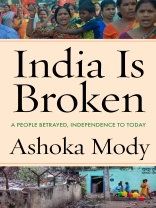A provocative new account of how India moved relentlessly from its hope-filled founding in 1947 to the dramatic economic and democratic breakdowns of today.
When Indian leaders first took control of their government in 1947, they proclaimed the ideals of national unity and secular democracy. Through the first half century of nation-building, leaders could point to uneven but measurable progress on key goals, and after the mid-1980s, dire poverty declined for a few decades, inspiring declarations of victory. But today, a vast majority of Indians live in a state of underemployment and are one crisis away from despair. Public goods—health, education, cities, air and water, and the judiciary—are in woeful condition. And good jobs will remain scarce as long as that is the case. The lack of jobs will further undermine democracy, which will further undermine job creation. India is Broken provides the most persuasive account available of this economic catch-22.
Challenging prevailing narratives, Mody contends that successive post-independence leaders, starting with its first Prime Minister, Jawaharlal Nehru, failed to confront India’s true economic problems, seeking easy solutions instead. As a popular frustration grew, and corruption in politics became pervasive, India’s economic growth relied increasingly on unregulated finance and environmentally destructive construction. The rise of a violent Hindutva has buried all prior norms in civic life and public accountability.
Combining statistical data with creative media, such as literature and cinema, to create strong, accessible, people-driven narratives, this book is a meditation on the interplay between democracy and economic progress, with lessons extending far beyond India. Mody proposes a path forward that is fraught with its own peril, but which nevertheless offers something resembling hope.
Spis treści
1. Then and Now, an Introduction
2. An Uncertain Beginning
3. The Path Not Taken
4. Nehru’s Dangerous Gamble
5. Nehru Doubles His Bet
6: Tagore’s Unheard Song
7. Mr. Nehru’s Tragedy, Democracy’s First Betrayal
8. Shastri Makes a Brave Transition
9. A Savior for India’s Ferment
10. India Has an Empress
11. Anger Meets Repression
12. An Autocratic Gamble Fails
13. Democracy Betrays Again, Deindustrialization Begins
14. When the Violence Came Home
15. A Pilot Flies into Political Headwinds
16. Rajiv Unleashes the Gale Force of Hindu Nationalism
17. An All-Too-Brief Moment of Sanity
18. The Promise Has a Dark Underbelly
19. No, India Does Not Shine
20. As the Two Indias Drift Apart, Democracy Creaks
21. Modi Pushes the Economy off the Edge
22. Modi Breaks India’s Fractured Democracy
23. COVID-19 Bares the Moral Decay
Epilogue: A Feasible Idealism
O autorze
Ashoka Mody is an economic historian at Princeton’s School of Public and International Affairs. Formerly, he worked at the World Bank and the International Monetary Fund. He is the author of
Euro Tragedy: A Drama in Nine Acts (2018), and his writing appears often in outlets such as
Financial Times,
Project Syndicate, and
Bloomberg View.












